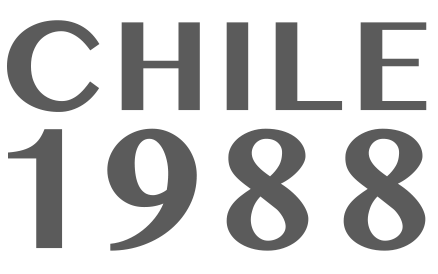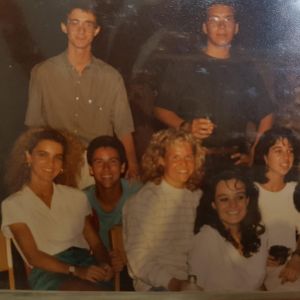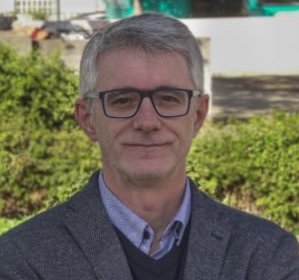I’m going to start a little earlier. I was born in 1970, in April, and in September 1970 Salvador Allende won the elections. On the same day that Allende won the elections, my father, who had voted for Alessandri, decided that we as a family had to go and live in Spain. My mother is Spanish, and they had been married for four years. They had met on a trip my father made to Spain, and she was born and raised in Spain. After they got married, my father brought her to Chile, and we came to live in Chile. Having voted for Alessandri, my father believed that Allende was going to lead the country to chaos, so to speak. And since he worked in tourism, we went to live in the Canary Islands, and by November, when Allende won in September, we were already in the Canary Islands, which was experiencing a tourism boom. My father was the general manager of a travel agency here in Chile. So, I have practically been living in the Canary Islands since I was 6 months old. I did all my elementary and secondary education in the Canary Islands, in Spain, and from a very early age, I had the feeling. I remember the moment when my father told me that I was, that I was a foreigner, and I asked my father, “Dad, what does it mean to be a foreigner?” And he told me, “Being a foreigner is this, and you are a foreigner in Spain.” And at that moment, it was like I started looking for a place where I wouldn’t be a foreigner.
In my home, we always talked a lot about Chile, especially my mother. The Spanish woman talked a lot about Chile in my home. So, the memory was always present. The possibility of returning to Chile was in my father’s mind until the early 80s, until the crisis of ’81 occurred here in Chile. The idea of returning to Chile was always present. When the crisis happened, my father realized that returning to Chile didn’t make much sense, but we continued talking about Chile, and in my mind, Chile remained the place where I wouldn’t feel like a foreigner. We came to Chile to have my mother undergo surgery in ’88 for a procedure that was being performed in only three places in the world, and one of those places was the Las Condes Clinic. Taking advantage of the fact that we came for my mother’s surgery, I was already halfway through my senior year during the Christmas vacation in Spain. We came with the whole family, and while my mother was recovering, I contacted universities and there I realized and found out about the Catholic University and asked what I needed to do to come and study at the university here, having studied in Spain. I decided to come to Chile, and in October ’89, I landed in Chile on October 3rd and applied to the Catholic University and started studying history there. Studying history was also part of this search for identity, for feeling part of somewhere, so it was part of the same process.
I arrived in Chile on October 3rd, ’89, I didn’t have time to register because the voter registration was already closed, so I didn’t have the opportunity to vote for Aylwin. I started university in March ’90, already with Aylwin, with Aylwin being elected president, and a few days after starting university, Aylwin was already taking office. So, I experienced the whole transition, I experienced it while I was studying and I experienced it by witnessing the transition, having also lived, although I was very young, what the Spanish transition was like. I have memories of the referendum in ’78, when the Constitution is approved in Spain, the Constitution. I have a very vivid memory and great admiration for Adolfo Suárez, who was the first elected president after that era. First, they appoint him, let’s say, the King appoints him, and then in the first election, he is chosen with UCD, which was the party of the Union of Democratic Centre. I have a very vivid memory of the Spanish transition, I have a very vivid memory of February 23rd, ’81, of the attempted coup d’état that happened in Spain. So, when I come to live in Chile and start my studies in ’90, I begin to realize that there are several parallels between what is experienced in this country, what I remembered from having lived in Spain as a young boy and teenager, and what I was already experiencing in Chile as an adult starting my university career, so to speak.
So, I arrived, from the very first day I arrived in Chile. In fact, the connection was established since we came to operate on my mother, and when I arrived to live in Chile, my father was with me for a couple of weeks while I settled in. We looked for an apartment while dealing with university paperwork. But after two weeks, my father left and I was left alone at 19 years old, with my family on the other side of the world, and the connection remained constant. So, from the first day, I said, “I’ve arrived in Chile, this is my place.”
So, I have a very clear memory of the country I arrived in. Coming from two things, I was struck by them. On one hand, I came from having lived in the Canary Islands, in Spain during the period of cultural liberation that occurred rapidly after the death of Franco. And coming to Chile was like arriving at, not to say a convent of nuns, but arriving in a country that was culturally not only burdened by the dictatorship, censorship, and cultural repression of the regime, but also morally very closed. Very, very conservative, to use an expression. On one hand, that caught my attention a lot. I mean, it was the strongest contrast, having left Gando, which was the airport in Las Palmas, an airport where all the tourists arrived, at that time, four or five million tourists every year, and arriving at the old Pudahuel airport, which was just a field, which it was the airport of the country’s capital. The contrast was very strong. It was like coming from tourist Europe to this lost place at the end of the world. That was on one hand. And the other thing that struck me a lot was the material poverty that was experienced in Chile at that time. We’re talking about, of course, now we can put a number on it, but at that time, I didn’t have those figures. We’re talking about a country with 40 percent of the population living in poverty. So, for example, when I arrived in October, I started university in March, and during those months, I didn’t have any friends. Basically, I had a lot of free time and a car because my father left it for me, he bought me a second-hand car. So, there were days when I had nothing to do. I would take the car and drive around the entire Américo Vespucio ring road, which is now a highway. At that time, it wasn’t a highway, so it allowed you to travel around Santiago completely, and when I reached the Américo Vespucio area, which was in Las Condes, Vitacura, it was another, another Chile. I mean, seeing the inequality embodied in unequal urban development was brutal. It was a very poor country. So, on one hand, I was struck by the cultural closed-mindedness, the conservative values of this country, and on the other hand, the material poverty that one experienced, which in Spain, in the Canary Islands, one did not see. There were poor people in the Canaries, but you didn’t see that poverty, so to speak.
A very specific anecdote. I remember in 1990, when I was the president of the History Students’ Association, at that time, we must have been two or three months into the school year. They chose me as the class delegate, I don’t know why. I introduced myself and the delegate for the graduating class started talking to me about Mecano, the Spanish group. I told him a little about my story. They said, “hey, why did you come from Spain? In Spain Mecano, a group that had a song called, I think it’s called ‘De mujer a mujer’ (From Woman to Woman), a song where they promote lesbianism and defend lesbianism.” I hadn’t even realized that was the content of the song. That’s when I realized that my life experience, my cultural experience, was something I didn’t pay attention to, but for them, it was very groundbreaking because it was part of my daily life. When I went to school in Spain, in secondary education, in Las Palmas, in the city where I lived, the school was in the area near the port, which was the Red Light District. So, on my way to school, I would pass by prostitutes, see transvestites, and see lesbians. For me, sexual diversity was normal in late 80s Spain. And then I arrived in this country where sexual diversity was just starting to be acknowledged. But in Chile, in 1990, all homosexuals, all lesbians, lived in the closet. Nobody publicly confessed their sexuality. That’s why in this anecdote, when the president of the University Students’ Association mentioned that Mecano song, which I had heard before, it was about two lesbians, which for me was the most natural thing.
I had a brief stint in activism. In my first or second year of university, I don’t quite remember, I joined the Socialist Youth. I grew up in Spain during Felipe González’s time. I am a social democrat. I identify as a social democrat. During my first summer here, thanks to a friend of my dad’s, I started working at a fruit packing plant in Buin, specifically in the Quality Control department. There, I met several guys who were doing their professional internships and who were all either communist or socialist activists. While talking to them, I told them, “I’m a social democrat, and I believe that the future of Chile lies in social democracy.” They responded, “No, social democracy doesn’t have a place in Chile.” Of course, we were talking about the time of the Socialist Party, Clodomiro Almeyda, a Socialist Party that was still in the process of rebuilding. At that time, Lagos represented the social democrats, but there was the PPD, this thing, this hybrid, this somewhat instrumental party.
But I had the idea that social democracy could have a future in Chile, and soon enough I realized that no, I mean, I said back then, I joined the Young Socialists and after two or three months, there was an internal election to choose the president of the Young Socialists. There was a candidate who, from what I voted for, defended social democracy, and there was a candidate who declared, “I am a Marxist-Leninist.” The Marxist-Leninist candidate won with 95 percent of the votes. So, I realized that the political ideology I had been raised with in Spain, which I felt identified with, had no space in Chile at that time. It had space among the elites. I believe the Concertación was a great experiment, a great exercise in social democracy, with all the good and bad that comes with it. I think the moderation and stability that the Concertación brought to the transition, albeit giving up in some aspects, contributed to Chile’s progress. But as we see now, this elite-centered social democratic exercise never really had a strong foundation in the social base. So, I feel very comfortable in that regard. I feel that Chile is my place. I like Chilean politics, but I do feel like I’m a minority within the center-left.


